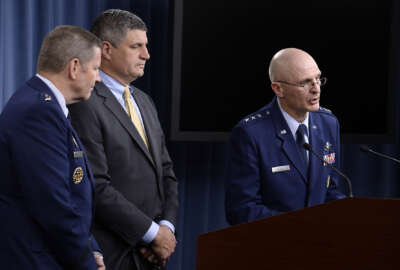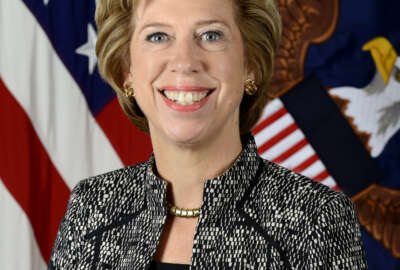
Air Force wants to slash acquisition red tape with new charter
The Air Force is making some of the authorities in its rapid capabilities office usable on a broader scale.
The Air Force is expanding some of the authorities that have proven successful within its rapid capabilities office to help procure larger and more traditional weapons.
The charter, which will be directly overseen by a board of directors and the Air Force Secretary, extends “the rapid and agile operating principles we’ve demonstrated on classified programs to other designated activities in order to expedite fielding,” Maj. Emily Grabowski, an Air Force spokeswoman, told Federal News Radio.
The new authorities allow for early and prominent involvement of airmen in the developmental and operational testing of Air Force systems. They also create short, narrow chains of command with direct oversight from senior Air Force leaders, establish small integrated teams of experienced people to operate under a single program officer and allow for the use of waivers to cut through encumbering red tape.
As for what programs the Air Force will use the new authorities on, it still has not decided.
“It has just been approved. We have ideas of some [programs it could be used for]. It’s one tool in our toolbox. We have a lot of tools out there. Everything probably can’t fit under that model because of the board of directors construct and we have to respect who will be engaging on each individual program, but we have a few in mind,” Darlene Costello, the principal deputy assistant secretary for Air Force acquisition and logistics said during a Feb. 22 roundtable with reporters in Orlando, Florida.
Air Force Secretary Heather Wilson said the new charter is a clear message to industry.
“We are trying to do things differently and drive innovation, move quickly and take bureaucracy out of the way of program managers. One of our biggest programs is the B-21. We are doing that through the rapid capabilities office. This is much more like the U-2 and the SR-71. We’re not going to goop it up in a lot of bureaucracy. We think there are other programs that we can manage in that way and we want to encourage program managers to take advantage of it and to give them an umbrella under which we are willing to run programs so that they don’t have to spend a lot of time managing the Pentagon” Wilson said.
Wilson added she wants to create an atmosphere where program managers can easily try new things without jumping through hoops.
“The charter is already there,” she said.
Lt. Gen. Arnold Bunch, the military deputy for the Air Force assistant secretary for acquisition hinted last fall that the Air Force was interested in forming the charter.
“We have taken the charter that the Rapid Capabilities Office was formed on. We have modified that charter. … What we are trying to do is inculcate that culture across the acquisition enterprise,” Bunch said during an Oct. 17, 2017 speech at an Air Force Association event in Arlington, Virginia. “We have morphed that charter so that we can apply it broadly across the Air Force.”
Bunch said the goal is to identify areas where the Air Force can form small teams that will streamline reviews and get them out of the “regular churn” of other programs.
“Instead of writing a charter every time I want to go fast on a program, I have a blanket charter where I can sign a memo and tell the program executive officer, ‘You execute under these authorities, here’s the charter, go run it,’” Bunch said.
Copyright © 2025 Federal News Network. All rights reserved. This website is not intended for users located within the European Economic Area.
Scott Maucione is a defense reporter for Federal News Network and reports on human capital, workforce and the Defense Department at-large.
Follow @smaucioneWFED





